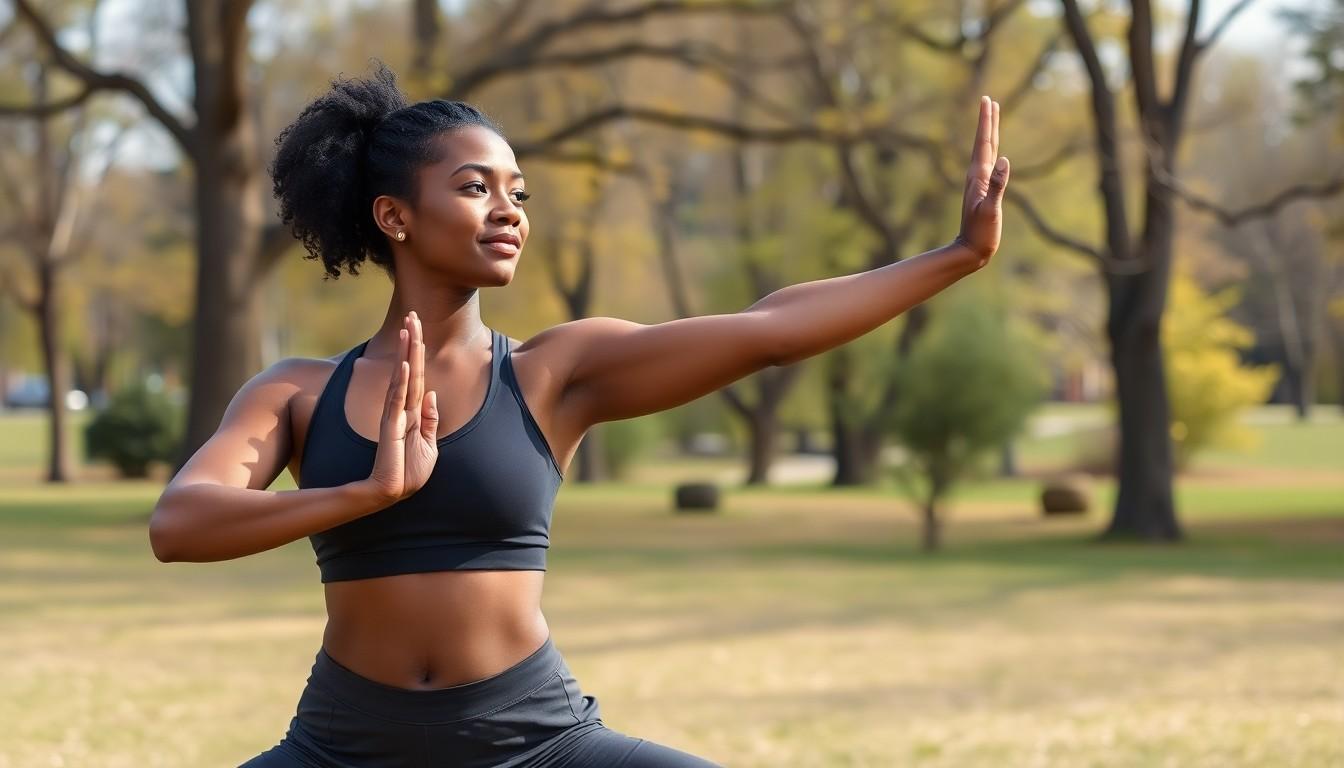In a world that often overlooks their needs, self-care for Black women isn’t just a luxury; it’s a necessity. Think of it as putting on your oxygen mask before helping others—because let’s face it, if you’re running on empty, you can’t pour from an empty cup. From the hustle of daily life to the weight of societal expectations, self-care becomes a powerful act of resistance and rejuvenation.
Imagine a space where pampering meets empowerment. Whether it’s indulging in a luxurious bubble bath or diving into a good book, self-care offers a chance to reclaim joy and build resilience. It’s time to prioritize well-being and celebrate the unique experiences that shape Black womanhood. So grab your favorite face mask and let’s explore how self-care can transform not just your day, but your entire outlook on life.
Table of Contents
ToggleUnderstanding Self Care for Black Women
Self-care for Black women encompasses various practices that prioritize mental, emotional, and physical health. This approach focuses on creating spaces for relaxation and reflection amid societal challenges. Emphasizing the necessity of self-care highlights that it strengthens well-being and resilience.
Culturally, self-care serves as a powerful act of resistance, allowing Black women to reclaim their time and joy. Engaging in activities like journaling, meditation, or yoga fosters a deeper connection to oneself. Moreover, nurturing relationships with friends and family enhances feelings of support and belonging.
Many Black women face unique stressors, such as racial discrimination and gender bias. Acknowledging these challenges can empower women to seek strategies that address their needs. Simple practices, such as setting boundaries and saying no, contribute significantly to overall well-being.
Numerous studies reveal the positive impacts of self-care on mental health. For instance, prioritizing mental wellness activities reduces anxiety and increases happiness. Creating routines that incorporate exercise, healthy eating, and creativity cultivates a holistic approach to self-care.
Mindfulness practices, including deep breathing and gratitude, enhance emotional awareness. Sharing experiences in safe spaces and community forums fosters connection and opens dialogues about challenges. Embracing self-care helps Black women thrive, reinforcing their strength and individuality.
Understanding self-care entails recognizing its vital role in enhancing quality of life. Adopting intentional daily practices can lead to profound changes in perspective and overall happiness.
Importance of Self Care

Self-care serves as a vital practice for Black women, promoting both well-being and resilience. Prioritizing personal health fosters a sense of empowerment in navigating daily challenges.
Mental Health Benefits
Engaging in self-care significantly boosts mental health. Practices like journaling enhance self-reflection and emotional processing. Meditation reduces stress, which lowers anxiety levels. Cultivating mindfulness increases emotional awareness and promotes happiness. Social connections improve support systems, leading to healthier coping mechanisms. Studies show that routines incorporating self-care activities overall lead to increased life satisfaction. Furthermore, prioritizing mental health through self-care reinforces resilience against societal pressures.
Physical Health Benefits
Physical health also benefits greatly from self-care. Regular exercise strengthens the body and improves cardiovascular health. Healthy eating fuels energy levels and enhances mood. Activities such as yoga promote flexibility and reduce physical tension. Self-care routines that prioritize rest rejuvenate the body and prevent burnout. Hydration remains crucial, fostering better skin and energy levels. Research indicates consistent self-care practices correlate with lower chronic disease risks. Prioritizing physical health through self-care nurtures overall well-being and vitality.
Types of Self Care Practices
Self-care encompasses various practices that enhance overall well-being. These practices fall into distinct categories, including emotional, physical, and spiritual self-care.
Emotional Self Care
Emotional self-care focuses on nurturing mental health and fostering resilience. Activities like journaling and creative expression promote emotional processing. Engaging in mindfulness practices, such as deep breathing or meditation, helps reduce stress and enhance clarity. Additionally, establishing boundaries is essential for protecting mental health. Black women often face external pressures, so prioritizing emotional needs offers a sanctuary. Moreover, connecting with supportive friends or family fosters a deeper sense of belonging and validation.
Physical Self Care
Physical self-care involves maintaining a healthy body to support overall wellness. Regular exercise, like walking or dancing, boosts mood and reduces anxiety. Nutritious eating habits contribute to sustained energy and vitality. Incorporating restful sleep into daily routines promotes recovery and mental clarity. Yoga and stretching also enhance flexibility and relaxation. Though busy schedules often disrupt self-care routines, small adjustments can lead to significant fitness improvements. Black women can tap into community resources or fitness groups for motivation and support.
Spiritual Self Care
Spiritual self-care encourages a connection to one’s core beliefs and values. Engaging in practices like meditation or prayer fosters inner peace and strengthens resilience. Spending time in nature allows reflection and provides grounding. Celebrating cultural origins through traditions creates a sense of identity. Community involvement, such as participating in group activities or rituals, reinforces social ties and spiritual growth. Finding purpose and meaning through self-exploration enriches personal insight and emotional strength. This holistic approach benefits mental health and overall satisfaction.
Barriers to Self Care for Black Women
Numerous barriers hinder self-care for Black women, impacting their well-being and resilience.
Societal Expectations
Societal expectations place immense pressure on Black women to prioritize others over themselves. They often juggle multiple roles, such as caregiver, employee, and community leader, leading to burnout. Moreover, cultural narratives frequently emphasize strength and resilience at the expense of self-care. Many Black women face stigmas surrounding self-care, perceived as self-indulgent or selfish. These stereotypes can discourage them from seeking time for rest or relaxation. Ultimately, societal norms perpetuate a cycle that limits their ability to prioritize personal well-being.
Access to Resources
Access to resources plays a crucial role in the ability of Black women to engage in self-care. Financial constraints often limit opportunities for activities such as gym memberships, therapy sessions, or wellness retreats. Moreover, many communities lack access to mental health services, reducing available support. Transportation issues can further complicate access to physical health amenities like grocery stores offering fresh produce. Lastly, systemic barriers often hinder the availability of culturally competent care, leaving many Black women without the necessary resources to address their unique challenges.
Tips for Effective Self Care
Implementing self-care practices can significantly enhance well-being for Black women. Here are some actionable tips to consider.
Creating a Self Care Routine
Establishing a self-care routine forms the foundation for consistent well-being. Developing personalized practices that fit individual lifestyles fosters resilience. Prioritizing activities like journaling, meditation, or exercise leads to profound emotional and physical benefits. Setting aside specific times each day ensures these essential practices aren’t overlooked. Incorporate enjoyable activities, such as reading or art, to maintain motivation. Adjust daily tasks to create systems that support overall health. Evaluate this routine frequently, making adjustments as life circumstances change.
Finding Supportive Communities
Connecting with supportive communities strengthens self-care efforts. Seek out groups founded on shared experiences, which can foster connection and understanding. Engaging with local organizations, online forums, or social media can lead to valuable networks. Building relationships with others encourages open discussions about challenges unique to Black women. Furthermore, these spaces often provide emotional support and accountability. Attending workshops or group activities promotes both personal growth and shared learning. Explore community resources to amplify self-care practices while uplifting peers.
Self-care for Black women is an essential practice that nurtures both mind and body. By prioritizing their well-being, they can combat societal pressures and reclaim their joy. Simple yet impactful self-care routines can lead to enhanced resilience and a renewed sense of purpose.
Creating supportive communities plays a crucial role in this journey. Sharing experiences and fostering connections can provide the emotional backing needed to navigate challenges. As Black women embrace self-care, they not only uplift themselves but also inspire others to do the same. It’s a powerful act of resistance that celebrates individuality and fosters a deeper connection to self and community.



